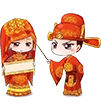春节来源英文介绍简短-春节来源英语简短加翻译20字
- 素琴词
- qiazhi
- 2024-01-31 14:26:01
1 春节来源英文介绍简短
The Spring Festival, also known as Chinese New Year, is the most important traditional festival in China,It is celebrated on the first day of the lunar calendar and lasts for 15 days,The festival is deeply rooted in Chinese culture and holds great significance for the Chinese people.
The origins of the Spring Festival can be traced back thousands of years,Legend has it that a mythical monster called Nian would come out once a year to prey on people and their livestock,In order to protect themselves, villagers would hang red lanterns and Spring Festival couplets on their doors, set off firecrackers, and wear red clothes,They believed that Nian was afraid of the color red, loud noises, and bright lights,Over time, these traditions evolved into the customs we see today.
The Spring Festival is a time for family reunions and expressing good wishes,People travel long distances to be with their loved ones and celebrate the new year together,The tradition of the annual reunion dinner is a highlight of the festival,Families gather around the table to enjoy a lavish feast filled with symbolic dishes, such as fish for abundance, dumplings for wealth, and glutinous rice cake for a higher position or better fortune,The reunion dinner represents unity and hope for a prosperous year ahead.
Another important aspect of the Spring Festival is the exchange of red envelopes, known as "hongbao." These red envelopes are filled with money and given as gifts to children, unmarried adults, and elderly family members,It is believed that the red envelope brings good luck and wards off evil spirits,The act of giving and receiving hongbao is a gesture of well-wishing and blessings for the new year.
During the Spring Festival, traditional activities and performances are also held to add to the festive atmosphere,Dragon and lion dances are performed on the streets, accompanied by the loud beat of drums and cymbals,These mesmerizing dances are believed to bring good luck and fortune,The Lantern Festival, which marks the end of the Spring Festival, showcases beautiful lanterns of various shapes and sizes,People gather to admire the lanterns, solve riddles written on them, and enjoy cultural performances.
Apart from these traditional celebrations, the Spring Festival has also evolved with modern times,Many people now choose to travel during the holiday, both within China and abroad,This is known as "chunyun," or the Spring Festival travel rush, which is the largest annual human migration in the world,It is estimated that billions of trips are made during this period, as people seize the opportunity to relax, explore new places, and create lasting memories.
The Spring Festival has not only become an integral part of Chinese culture but has also gained recognition worldwide,In recent years, many countries and regions with Chinese communities have embraced the holiday and held their own celebrations,The festival has become a symbol of unity, multiculturalism, and the rich heritage of Chinese civilization.
In conclusion, the Spring Festival is a time-honored tradition that symbolizes new beginnings, family reunions, and cultural heritage,With its deep historical roots and meaningful customs, it remains the most celebrated festival in China,Whether through traditional customs or modern travel, the Spring Festival brings joy, love, and hope to people from all walks of life.

2 春节来源英语简短加翻译20字
春节,即农历新年,关键的传统节日。始于古代夜晚的祭祀活动,演变为一系列丰富多彩的庆祝活动。春节一般在农历正月初一举行,这亦是一年中家庭团聚的大日子。
春节的来历可以追溯到古代的传说。传说中,有一个叫"年"的怪兽,会在农历新年来袭,伤害人们和动物。人们发现年怪害怕红色 爆竹声和火,由此他们开始用红色装饰,点燃爆竹和放烟火来驱除这个怪物。这就是春节庆祝活动的起源。
春节期间有很多习俗和传统。关键的是吃年夜饭,这是家人团聚的时刻。年夜饭一般包括鱼 糖醋排骨 饺子 汤圆等传统的菜肴。这些食物有吉利的象征,如鱼代表富裕,饺子代表财富。还有红包的传统。红包是一种装有钱的红色封袋,一般由家长给子女和晚辈。这是给予祝福和幸运的一种方式。
除了吃饭和收红包,春节还有其他庆祝活动。人们会在大街上观看花灯和龙舞表演,这是为了驱除邪灵和迎接幸运的到来。还有舞狮 踩高跷 放烟火等传统表演,使得整个节日充满欢乐和喜庆。
对于人来说,春节是一年中关键的节日。不仅代表了新的开始和希望,亦是社交和家庭团聚的时刻。每个人都会回到家乡,和家人共度假期。这个传统节日传承了几千年,承载着人民对过去的尊重和对将来的期待。
春节是关键的传统节日,代表家人团聚 祝福幸福和希望新的一年的到来。不管身在何处,每个人都会热切地期待春节的到来。共同庆祝这个充满喜庆和传统的节日!
Spring Festival, also known as Chinese New Year, is one of the most significant traditional festivals in China,It originated from ancient sacrificial activities and evolved into a series of vibrant celebrations,The festival is typically held on the first day of the lunar calendar, which is also a day for family reunion.
The origin of Spring Festival can be traced back to ancient legends,According to the legend, there was a monster called "Nian" that would come and harm people and animals during the lunar New Year,People discovered that the monster was afraid of the color red, loud noises like firecrackers, and fire,As a result, they started using red decorations, lighting firecrackers, and setting off fireworks to drive away the monster,This is the origin of the festive activities during Spring Festival.
During the Spring Festival, there are various customs and traditions,The most important one is the reunion dinner, a time for family gathering,The dinner usually includes traditional dishes such as fish, sweet and sour spare ribs, dumplings, and tangyuan,These foods have auspicious meanings, such as fish symbolizing prosperity and dumplings symbolizing wealth,Additionally, there is the tradition of giving out red envelopes,Red envelopes are red packets containing money, typically given by parents to children and juniors,This is a way of giving blessings and good luck.
Aside from feasting and receiving red envelopes, there are other festive activities during Spring Festival,People enjoy watching lanterns and dragon dance performances on the streets to ward off evil spirits and welcome good luck,Traditional performances such as lion dances, stilt walking, and fireworks are also part of the celebrations, making the whole festival joyful and festive.
For Chinese people, Spring Festival is the most important festival of the year,It represents new beginnings, hope, and a time for socializing and family reunion,Everyone returns to their hometown and celebrates the holiday with their families,This traditional festival, with a history of thousands of years, carries the respect for the past and the anticipation for the future by the Chinese people.
In conclusion, Spring Festival is one of the most significant traditional festivals in China, representing family gathering, blessings, and the hope for a new year,Regardless of their current location, every Chinese person eagerly anticipates the arrival of Spring Festival,Let us all celebrate this joyful and traditional festival together!








